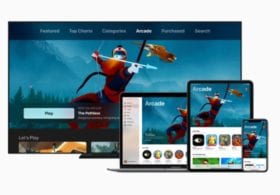By David Teich
Do you support a flat tax?
What’s the most important economic issue facing the country?
Who won the Republican debate?
Those are the kinds of online polls you may have seen on CNN’s Facebook page during the cable network’s GOP presidential primary debate last night. And afterward, you may have seen the audience’s responses broadcast to CNN’s live audience. CNN did the same thing at the most recent Democratic debate in November.
It’s all thanks to iPowow, a participation TV platform that allows audiences to interact with TV broadcasts using smartphones and social media. That participation might take the form of polls, or it might take the form of quizzes. And the show might be a political debate, a sporting event, or a cable drama. Here are the constants: The content is always interactive, and the audience engagement is always in real-time.
Gavin Douglas, the veteran TV pro-turned-iPowow CEO, talked to Cynopsis about the appeal of interactive content, the importance of intelligent data aggregation, and more.
Cynopsis: In the past, when iPowow has facilitated debate polling over Facebook, have you ever observed that the audience’s opinions have clashed with the media’s preferred narratives?
 Gavin Douglas: [With November’s Democratic debate], the pundits on all the panels were giving the debate to Hillary Clinton, but social media and our system inside Facebook were [calling] Bernie Sanders [the winner]. So the system creates its own stories and content, which I think is great for democracy. I think it’s incredibly good for democracy to have live polling, voting, and audiences participating in the political process. [But] some of our colleagues at various television networks – not CNN, but certain other ones – wouldn’t agree. Because they like to give the news to the audience, not have the audience have anything to do with the process of making it.
Gavin Douglas: [With November’s Democratic debate], the pundits on all the panels were giving the debate to Hillary Clinton, but social media and our system inside Facebook were [calling] Bernie Sanders [the winner]. So the system creates its own stories and content, which I think is great for democracy. I think it’s incredibly good for democracy to have live polling, voting, and audiences participating in the political process. [But] some of our colleagues at various television networks – not CNN, but certain other ones – wouldn’t agree. Because they like to give the news to the audience, not have the audience have anything to do with the process of making it.
Cynopsis: You say that iPowow can help democratize media coverage of debates. One might also argue that it can democratize TV in general.
Douglas: I agree, completely. I’m smiling, because it’s the first time I’ve heard somebody in your position agree with me. Television has changed radically in the last ten years. Audiences now have something in their lap, whether it’s a smartphone or a device of some sort, whilst they’re watching TV. That’s a given, and it’s inevitable. They’re already interacting with content on that device…At this point, what iPowow is doing is the only way we’ve seen for audiences to be able to lean in and interact with [TV]. And it’s all in real time. You’re clicking on a button here, and it affects the results there. That’s the reason we started the company: so we could let the audience affect the outcome of conversations in TV studios in real-time.
Cynopsis: Your clients are quite varied – CNN, ESPN, USA Network, etc. And the audience of a Democratic debate is quite different from that of a Republican one. How do you go about tailoring the content of polls and quizzes to specific audiences and programming?
Douglas: I’ll preface my answer by saying that everybody in this company was – or is – a TV producer or a TV engineer or a TV data specialist. Everybody came from television. I worked in TV starting in 1996, all the way to 2010. I worked on somewhere between 30 and 35 TV shows around the world. Having said that, we decided to build a straightforward, content-free platform. We know that the producers of these shows, just as we used to be, are close to the content. They know it and love it far more than we do. So we train them, we hand the system over, and we give them the best practices. Then they create the content and the questions, and run the system themselves. The challenges, really, are with them: How to ask the questions, what to ask at what point, how to bring that into the conversation in the pre-show and the post-show, and how to bring audience opinion into the storytelling process.
Cynopsis: Have you ever observed media pros flat-out disagreeing with the results that iPowow polls produce?
Douglas: Oh sure. In an industry as wide-ranging as television, there will always be people who will look at audience opinion and factual, auditable numbers, and say, “Well, I don’t believe it.” That’s par for the course with most news and politics. But 180,000 iPowow users logged in through Facebook to answer questions [for the November debate] – that’s an awfully large number of people.
Cynopsis: Would you say that iPowow is similar to a social media platform?
Douglas: We’re kind of in the middle of social media and TV: iPowow is participation television, and it’s interactive. You can press on [a candidate’s] face, and the percentages move up and down in real-time. The social media conversation is going on around the show. But in a way, iPowow is inside the show’s storyline second by second…iPowow is super-charging the social media conversation. There are hundreds of thousands of tweets and Facebook posts floating around in social media – but our system [enables users] to click on a single button…and watch the percentages rise and fall on TV. They’re given a definitive result to a question, whereas social media is opinion-based.
Cynopsis: In terms of audience engagement, what are some of the differences between iPowow and social media platforms like Facebook and Twitter?
Douglas: Tweets and Facebook posts drag your attention away from the main television screen, which is where the million-dollar content is – the content that advertisers want to make sure you’re watching. If you look down and start interacting with your followers on Twitter, or your friends on Facebook, or you’re going to Instagram, then you’re no longer watching or interacting with the TV show. We’ve managed to overcome the challenge of what we call “heads-up, heads-down.” Spending too long looking at your second screen takes away from “heads-up” – looking at the TV. Our vision was to have everybody interacting with the device in their hand, and to connect them to the content that they’re watching on TV. So we’ve made it very simple, with big buttons that you click once before looking back up.
Cynopsis: You mention advertisers. What does it mean to them to have more reassurance that audiences are paying attention to content?
Douglas: As we all know, TV has shifted more and more towards video on demand, and time-shifting viewing, and skipping ads. Anything that can be done to help advertisers and sponsors have people watching their ads is incredibly valuable to them. And it’s also incredibly valuable to have intelligent audience data saying, “This many people actually did watch your ad.
Cynopsis: Just how much work does iPowow do in the field of data insight?
Douglas: Most of our clients are layering our metrics platform on top of the Nielsen, comScore, and Rentrak data. We have an incredibly powerful audience data aggregation system. We’re collecting enormous amounts of visitor and demographics data on the audience, and helping our clients with that data. We’re giving them intelligent audience data on their shows. For example, for an episode of Suits on USA Network, we had 32,000 people actually watching the show and playing along with a trivia game. And we have a deep set of data about those viewers that interacted. So USA Network then takes that data back their advertisers and says, “Look, here’s another layer of data that we have on our audience.” And we know that the audience is watching the show in real time – therefore, by default, they have to watch the commercials as well.
Cynopsis: How exactly do your clients use the data that you give them?
Douglas: We provide these reports to each of our clients. And because television is a very wide and differentiated business, they use it in very different ways. Some of them have very hot research and data departments who are on the phone to us every week saying, “So what else can we have, how does this work?” And we give them access to bits and pieces that they want to have access to. Others couldn’t care less. They’re just hard at work creating great shows that have great ratings, and bringing in lots of revenue through advertising.
Cynopsis: By and large, do you think most companies are making enough use of intelligent audience data?
Douglas: There are some companies that are ahead. But some are not doing enough, given that intelligent audience data is the future of television. If that hasn’t become clear [to a company] by now, then somebody needs to be fired. 2016 is going to be the year of intelligent audience data in TV.
Cynopsis: And what does that mean for iPowow?
Douglas: We’re in a very fortunate position. As [Wayne] Gretzky said, we’ve skated to where the puck’s going to be next year. We’re trusting that our clients will continue to value the fact that we engage the viewers and make things fun, but also that we give them insights into their audience characteristics.
Cynopsis: You’ve talked about how those insights can help companies with advertisers. Can those same insights also help to guide companies’ decisions when it comes to content creation?
Douglas: Absolutely – I think you’ve hit the next evolution on the head. This type of data that we’re able to give to our network clients doesn’t just optimize ad spends – it also optimizes programming and content choices.
The Cynsiders column is a platform for industry leaders to reach out to colleagues, followers, and the public at large. In their own words and in targeted Q&As, columnists address breaking news, issues of the day, and the larger changes going on in the ever-evolving world of television, video and digital. Cynsiders columns live on Cynopsis’ main page and are promoted across all daily newsletters. We welcome readers’ comments, queries, and column ideas at [email protected].






